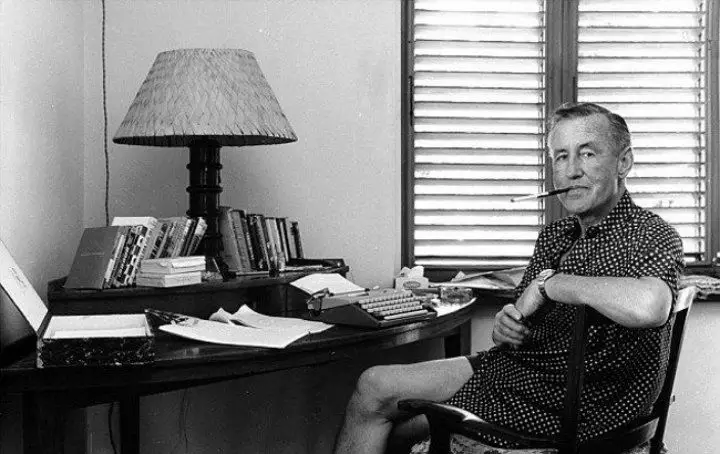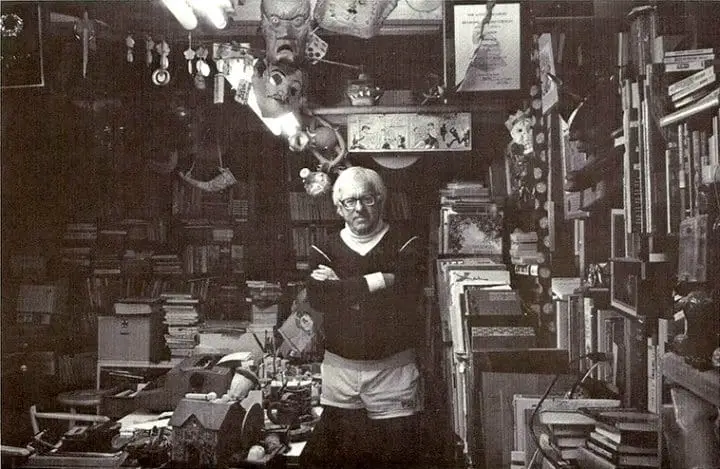
Everyone would like to write well, but not everyone is willing to put in the work.
The scariest part of any project is the beginning. When you stare against a blank page, you can hear the demons whispering – “let’s do this other thing instead, you’re not good enough, it doesn’t make sense.” But when you persist and do it anyway, this nagging voice gives way to the Muse. If you ever feel you’re stuck, re-read The War of Art by Steven Pressfield and re-watch Make Good Art by Neil Gaiman. It will help.
How To Write Well: 15 Writing Tips From Great Authors
The following guide contains ideas on writing well and starting writing in the first place. I constantly find the latter to be harder than the former. The ideas you’ll find here come from writers who made a difference in the world of literature. Make yourself comfortable in the presence of their quotes, ideas, and graphics, and then start to make your writing dreams a reality.
“The only way to learn to write is to force yourself to produce a certain number of words regularly.” ― William Zinsser
1. You need to sit down every day and practice the craft of writing
Christopher Hitchens warned against the booze trap. Many aspiring writers get the booze and paper and finish without the booze and without writing a single sentence. I’m sure that’s not you. If you’re reading this blog, you probably eat veggies and drink water. But seriously, when was the last time you sat down to produce? Do you have a daily routine? You have to sit down and write. That’s the hardest part. In “On Writing”, Stephen King says he writes 2000 words per day, every day. What’s your score?
“The scariest moment is always just before you start.” – Stephen King
2. Employ brevity in writing
“Omit needless words” still holds. Susan Sontag said you should “agonize over sentences” and so many other writers echo her advice. I work with freelance writers and I’m amazed at how much filler I find in their work. It’s not about writing 800 words. It’s about 800 words that’ll sizzle with facts and meaning. Just look at the best examples of English literature. In books like Catch-22, each sentence was forged and sharpened like a ninja blade. Pay heed.
“Brevity is the soul of wit.” – William Shakespeare
3. Revise your written pieces
Mozart wrote some of his pieces note-perfect, the very first time. Chances are you’re not Mozart and your work needs a bit of editing. William Zinsser said that during editing, he got rid of every third word from his first draft. That’s painful, but necessary.
“Kill your darlings, kill your darlings, even when it breaks your egocentric little scribbler’s heart, kill your darlings.” – Stephen King
4. The mystery of style
Style is not something you add to your prose. It’s also not about using fancy words. Hemingway preferred concise vocabulary and yet he had style. There’s no extra filler in “The Sun Also Rises” and there’s no pomposity. Instead of saying “because” say “because”. Simplicity and directness are the elements of style.
“People think that I can teach them style. What stuff it all is! Have something to say, and say it as clearly as you can. That is the only secret of style.” – Matthew Arnold

5. Choose your words carefully
Just any word won’t do. Great authors recommend using a dictionary and learning about different shades of meaning. It’s good to study this by reading poetry which often gives us this sudden moment of illumination. It’s caused by just a few words put carefully together.
“What might have been is an abstraction Remaining a perpetual possibility Only in a world of speculation. What might have been and what has been Point to one end, which is always present.” – T.S. Eliot, Burnt Norton
And then we have phonaesthetics or the study of beautiful sounds in language. Great authors make music with words and you should too.
“If music be the food of love, play on, Give me excess of it; that surfeiting, The appetite may sicken, and so die.” ― William Shakespeare, Twelfth Night
6. It’s all in the title and the lead
With unlimited reading choices available, it’s hard to convince someone to read your piece. According to the legendary adman David Ogilvy:
“On the average, five times as many people read the headline as read the body copy.”
The next essential element after the title is the lead (the introductory paragraph). Its job is to grab the attention of the reader and pull her in.
Take a look at the leads from some of the best essays of all time:
- “I’ve been to Australia twice so far, but according to my father I’ve never actually seen it.”
- “Earlier this summer I was walking down West End Avenue in Manhattan and remembered, with a sadness that nearly knocked me off my feet, just why I came to New York seven years ago and just why I am now about to leave.”
- “I know it is coming, and I do not fear it, because I believe there is nothing on the other side of death to fear.”

7. Take time to do the research
Obvious research is not enough. What we need is deep research. Let’s say you’re writing a piece about your trip to Paris. You wouldn’t recommend the Eiffel Tower and croissants, would you? Writing well comes from a deep understanding of a subject. The first thing required is general knowledge obtained from books, culture, life, and experience. Next, it’s about studying finer details and creating an outline before you start writing.
“The greatest part of a writer’s time is spent in reading, to write: a man will turn over half a library to make one book.” – Samuel Johnson
8. Finish strong
In writing, there’s no need to make a final judgment on any topic. Even if you write a huge volume you can’t say it all. That’s why it’s better to pick the right angle, explore it, and then end well. Finish strong. Think about your last sentence and let their jaws drop.
“When I buy a new book, I always read the last page first, that way in case I die before I finish, I know how it ends. That, my friend, is a dark side.” – Nora Ephron
9. Don’t bother with the obvious
Were the chocolate pancakes tasty? Or have they transported you into a fit of raging ecstasy? Writing that something is nice, interesting, and very good is obvious and it’s to be avoided. If someone already wrote about the subject a thousand times in the same way, we don’t need a thousandth and one.
“It’s not the number of breaths we take, but the number of moments that take our breath away.” is exactly the kind of cliché BS to avoid.
10. What are you writing about?
In “On Writing Well” William Zinsser shares timeless advice he received from one of his teachers – “let’s not go peeing down both legs.” What he meant was that you should channel your writing focus only towards one end. Remember, you can’t cover everything in one piece. Cover one angle that would interest the reader. Don’t just ask what is it about. Ask – “What is it really about?” This will help you narrow down your focus.
“In displaying the psychology of your characters, minute particulars are essential. God save us from vague generalizations!” – Anton Chekhov
11. Mind the technicalities
Even if you spew out creative prose like a rocket launcher, it’s still useful to go through this checklist and ensure readability:
- Use examples when explaining difficult concepts.
- If you ever say “I think someone would understand this” it means they wouldn’t.
- Underestimate the vocabulary of your readers. Aim for clarity.
- Use concrete language instead of an abstraction.
- Use many sources while doing research (online sources are notoriously unreliable).
- Get feedback before you publish it.
- Revise, revise, revise.
- Make sure you respect all the grammar rules.
- Avoid using “quotes” where they don’t belong. It’s either a quote or it’s not.
- Explain technical terms.
- Don’t change the tense in the middle of the sentence (use parallel language).
- Use passive voice sparingly. Say “he did it” and not “it was done”.
- Go from general to more specific information.
- Not prevention – but prevents, prevented – don’t use dead nouns.
“If you have any young friends who aspire to become writers, the second greatest favor you can do them is to present them with copies of The Elements of Style. The first greatest, of course, is to shoot them now, while they’re happy.” ― Dorothy Parker
12. Be aware of the curse of knowledge
You may be one of the most knowledgeable people on the subject, but your readers certainly aren’t. It all depends on which audience you’re addressing. If you write for general readers, keep in mind that they need more explanations and examples than the experts. It’s easy to assume that other people will know what you’re talking about, but before you hit “publish”, ask yourself: “Would a smart but not an expert-level reader understand it?”
“Reading furnishes the mind only with materials of knowledge; it is thinking that makes what we read ours.” – John Locke
13. Does your text flow smoothly?
Some texts can be compared to a ride at the back of a rickety bus through a bumpy country road in the Indian mountains. Others, even if complicated, are a Ferrari ride on a German Autobahn. Aim for the Ferrari option. How to make your text suaver? Read it out loud and detect any bumps on the road. Also, break it down into paragraphs to make it easy on the eye.
“May what I do flow from me like a river, no forcing and no holding back, the way it is with children.” – Rainer Maria Rilke

14. Use vivid language. Make them imagine things
It’s strange, but the reader can sense if the writer is feeling good about their subject. Good writing makes the reader imagine things. By using “word pictures” you can let them imagine whole worlds for themselves. Be more vivid in your descriptions. Point with the words and create images in your reader’s mind. That’s where the magic happens.
“The best words not only pinpoint an idea better than any alternative but echo it in their sound and articulation, a phenomenon called phonesthetics, the feeling of sound.” – Steven Pinker
15. Write for someone
The worst thing you can do is to write to an unspecified mass audience. This kind of writing misses the point 99% of the time. Some of the best writers advise you to write to a single person – preferably a good friend. This allows for a personal bond between the reader and the scribbler. You could also try to write as you speak, and sprinkle your prose with a conversational flavor.
“Don’t try to visualize the great mass audience. There is no such audience—every reader is a different person.” – William Zinsser
Recommended reading:
- On Writing Well – William Zinsser
- On Writing – Stephen King
- The War of Art – Steven Pressfield
- The Sense of Style – Steven Pinker
- The Elements of Style – E. B. White and William Strunk Jr.
- Bird by Bird – Anne Lamott
- Writing Down the Bones – Natalie Goldberg
Next up, you may want to explore guides on how to make your writing shorter and more succinct.
Hey there, welcome to my blog! I'm a full-time entrepreneur building two companies, a digital marketer, and a content creator with 10+ years of experience. I started RafalReyzer.com to provide you with great tools and strategies you can use to become a proficient digital marketer and achieve freedom through online creativity. My site is a one-stop shop for digital marketers, and content enthusiasts who want to be independent, earn more money, and create beautiful things. Explore my journey here, and don't forget to get in touch if you need help with digital marketing.



